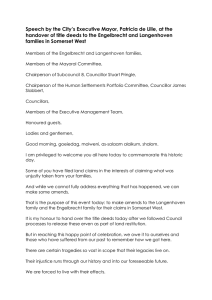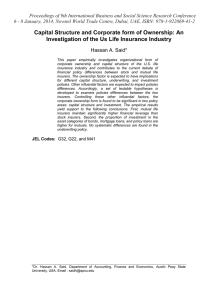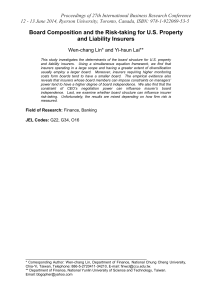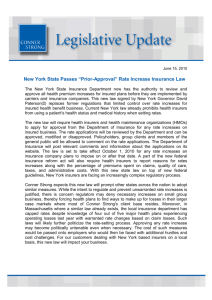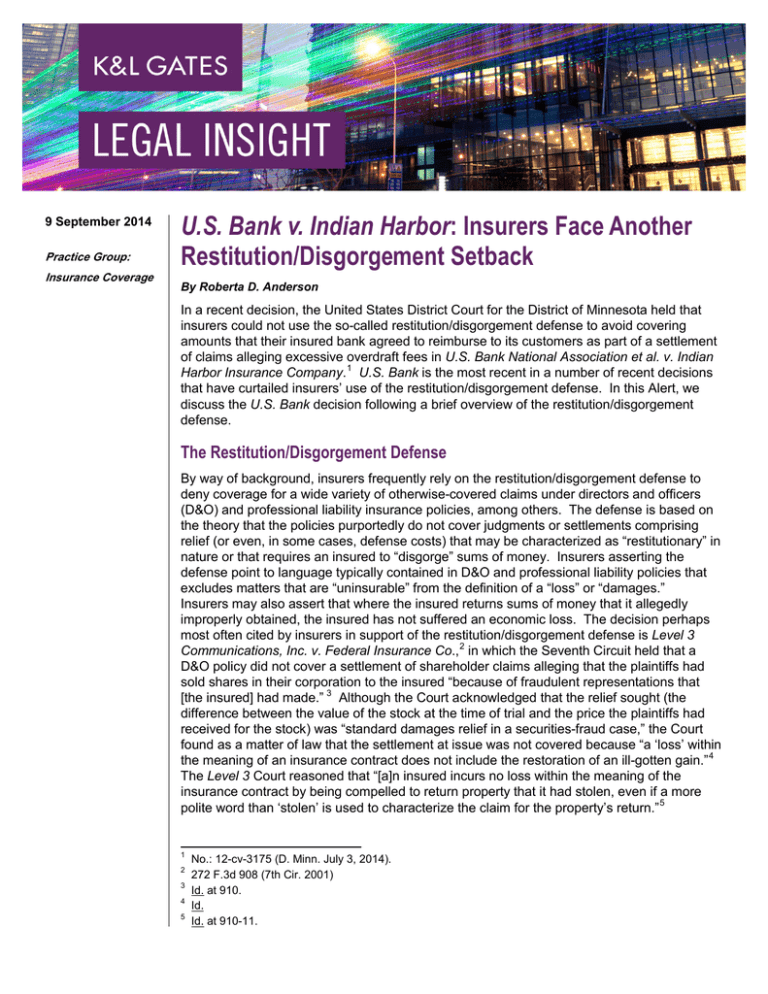
9 September 2014
Practice Group:
Insurance Coverage
U.S. Bank v. Indian Harbor: Insurers Face Another
Restitution/Disgorgement Setback
By Roberta D. Anderson
In a recent decision, the United States District Court for the District of Minnesota held that
insurers could not use the so-called restitution/disgorgement defense to avoid covering
amounts that their insured bank agreed to reimburse to its customers as part of a settlement
of claims alleging excessive overdraft fees in U.S. Bank National Association et al. v. Indian
Harbor Insurance Company. 1 U.S. Bank is the most recent in a number of recent decisions
that have curtailed insurers’ use of the restitution/disgorgement defense. In this Alert, we
discuss the U.S. Bank decision following a brief overview of the restitution/disgorgement
defense.
The Restitution/Disgorgement Defense
By way of background, insurers frequently rely on the restitution/disgorgement defense to
deny coverage for a wide variety of otherwise-covered claims under directors and officers
(D&O) and professional liability insurance policies, among others. The defense is based on
the theory that the policies purportedly do not cover judgments or settlements comprising
relief (or even, in some cases, defense costs) that may be characterized as “restitutionary” in
nature or that requires an insured to “disgorge” sums of money. Insurers asserting the
defense point to language typically contained in D&O and professional liability policies that
excludes matters that are “uninsurable” from the definition of a “loss” or “damages.”
Insurers may also assert that where the insured returns sums of money that it allegedly
improperly obtained, the insured has not suffered an economic loss. The decision perhaps
most often cited by insurers in support of the restitution/disgorgement defense is Level 3
Communications, Inc. v. Federal Insurance Co., 2 in which the Seventh Circuit held that a
D&O policy did not cover a settlement of shareholder claims alleging that the plaintiffs had
sold shares in their corporation to the insured “because of fraudulent representations that
[the insured] had made.” 3 Although the Court acknowledged that the relief sought (the
difference between the value of the stock at the time of trial and the price the plaintiffs had
received for the stock) was “standard damages relief in a securities-fraud case,” the Court
found as a matter of law that the settlement at issue was not covered because “a ‘loss’ within
the meaning of an insurance contract does not include the restoration of an ill-gotten gain.” 4
The Level 3 Court reasoned that “[a]n insured incurs no loss within the meaning of the
insurance contract by being compelled to return property that it had stolen, even if a more
polite word than ‘stolen’ is used to characterize the claim for the property’s return.” 5
1
2
3
4
5
No.: 12-cv-3175 (D. Minn. July 3, 2014).
272 F.3d 908 (7th Cir. 2001)
Id. at 910.
Id.
Id. at 910-11.
U.S. Bank v. Indian Harbor: Insurers Face Another
Restitution/Disgorgement Setback
In the wake of Level 3, in what appeared to be a troubling trend for insureds, other courts
accepted increasingly aggressive coverage denials based on the restitution/disgorgement
defense. 6
More recently, however, courts, including the District of Minnesota in U.S. Bank, have
properly curtailed insurers’ attempts to avoid coverage through the restitution/disgorgement
defense.
The Facts Of U.S. Bank
Beginning in 2009, three class actions were brought against U.S. Bank, allegedly that the
bank overcharged overdraft fees to its customers. 7 In particular, the class actions alleged
that U.S. Bank “re-ordered customers’ debit-card transactions from highest amount to lowest
amount (instead of chronologically), posted the transactions to customers’ checking accounts
in that order, and allowed the accounts to be overdrawn—thereby creating the most
overdrafts and maximizing the overdraft fees assessed on its customers.”8 The class actions
asserted a variety of common-law and statutory claims and sought the return of the excess
overdraft fees collected by U.S. Bank.9 U.S. Bank settled the class actions in 2013 for $55
million. 10
U.S. Bank sought coverage for the settlement from its professional liability insurers, Indian
Harbor Insurance Company and ACE American Insurance Company. The professional
liability policies at issue provided coverage for a “Loss”, which was defined to include “the
total amount which [U.S. Bank] becomes legally obligated to pay on account of each Claim
… made against [U.S. Bank] for Wrongful Acts … including, but not limited to, damages,
judgments, settlements, costs, pre-judgment and post-judgment interest and Defense
Costs.”11 However, the policies excluded from the definition of “Loss” “[m]atters which are
uninsurable under the law pursuant to which this Policy is construed.” 12 The U.S. Bank
Court referred to this exclusion from the “Loss” definition as the “Uninsurable Provision.” The
policies also contained an express exclusion for claims “brought about or contributed in fact
by any … profit or remuneration gained by [U.S. Bank] or to which [U.S. Bank] is not legally
entitled … as determined by a final adjudication in the underlying action.” 13 Both the
exclusion, which the Court referred to as the “Ill-Gotten Gains Provision,” and the
Uninsurable Provision are contained in some form in virtually all professional liability and
D&O insurance policies.
The insurers denied U.S. Bank’s coverage claim on the basis of the restitution/disgorgement
defense, citing principally to the Uninsurable Provision and relying on the Level 3 decision
and its progeny. In particular, the insurers argued that the settlement was not a covered
6
See, e.g., Conseco, Inc. v. National Union Fire Ins. Co., 2002 WL 31961447, at *6-7 (Ind. Cir. Dec. 31,
2002) (“It is axiomatic that insurance cannot be used to pay an insured for amounts an insured wrongfully
acquires and is forced to return, or to pay the corporate obligations of an insured … [A]n insured is not
allowed to profit from its wrongdoing through insurance.”).
7
U.S. Bank, No.: 12-cv-3175, Slip Op., at 1.
8
Id.
9
Id. at 2.
10
Id.
11
Id. at 2-3.
12
Id. at 3.
13
Id.
2
U.S. Bank v. Indian Harbor: Insurers Face Another
Restitution/Disgorgement Setback
“Loss” because the Uninsurable Provision “encompassed the settlement as legally
uninsurable restitution.” 14 According to the Insurers, “the settlement is restitutionary, and
restitution is uninsurable as a matter of law.” 15
U.S. Bank sued the Insurers for breach of contract and a declaratory judgment, and the
insurers moved for judgment on the pleadings.
The U.S. Bank Court’s Ruling
Applying Delaware law, the Court in U.S. Bank considered the insurers’
restitution/disgorgement defense based on the Uninsurable Provision. Noting that “[t]he
Insurers highlight several court decisions
that have rejected insurance coverage for restitution on the basis that returning money or
property to which one is not legally entitled can never constitute a loss,” the Court
nevertheless found that “[t]wo aspects of the policies’ clear language … contradict the
Insurers’ argument.” 16
First, the Court ruled that “the settlement is not uninsurable under Delaware law because no
Delaware authority has held that restitution is uninsurable as a matter of law,” noting that the
insurers “have failed to cite, and the Court cannot locate, any Delaware authority deeming
restitution uninsurable.” 17
Second, the Court found that the Ill-Gotten Gains Provision, which as noted is contained in
some form in virtually all professional liability and D&O policies, in fact evidenced that
restitution/disgorgement was specifically contemplated, and was excluded only where there
is, as required by the exclusion, a “final adjudication” as to the conduct at issue. As
explained by the Court:
[T]he policies exclude from coverage restitution resulting from a final adjudication
and by implication include within coverage restitution stemming from a settlement.
The Ill-Gotten Gains Provision excludes from coverage money to which U.S. Bank “is
not legally entitled” only “as determined by a final adjudication in the underlying
action.” This provision shows not merely that the parties contemplated the possibility
of coverage for restitution, but that they agreed coverage would exist unless the
restitution was imposed by a final adjudication. When an underlying action alleging
ill-gotten gains settles before trial, there is no final adjudication in that action. So
here, where the class actions alleging ill-gotten gains were settled before trial, there
is no final adjudication and the settlement is not excluded from coverage.18
The Court further reasoned that “[b]ecause the parties expressly excluded any restitution
resulting from a final adjudication through the Ill-Gotten Gains Provision, they must have
intended to include any restitution not resulting from a final adjudication (say, a settlement)
within the definition of ‘Loss’” and to “interpret the Uninsurable Provision to always preclude
14
15
16
17
18
Id.
Id. at 5.
Id.
Id.
Id. at 6 (citing Clarendon Am. Ins. Co., No. 04C-11-167, 2008 WL 2583007, at *7 (Del. Super. Ct. June 25, 2008)).
3
U.S. Bank v. Indian Harbor: Insurers Face Another
Restitution/Disgorgement Setback
coverage for restitution would nullify the Ill-Gotten Gains Provision, which plainly says that
only a final adjudication precludes coverage for restitution.” 19
The court distinguished Level 3 and its progeny on the basis that those decisions did not, in
contrast to the policy at issue in U.S. Bank, contain any exclusion requiring a “final
adjudication”:
The Court acknowledges the rule of Level 3 and its progeny that restitution is
generally uninsurable ... But virtually all cases the Insurers cite that follow Level 3 are
distinguishable because they involved policies without a specific provision requiring a
“final adjudication.” The parties here agreed that the Level 3 rule would only control
if a final adjudication—not a settlement—resolved that U.S. Bank was not legally
entitled to the overdraft fees and must return them. The parties knew about the
Level 3 decision when they executed the policies and still decided to cover a
settlement constituting restitution absent a final adjudication.20
The Court concluded that “Delaware law does not prohibit insurance for restitution and the
parties agreed that restitution is insurable when, as here, the underlying allegations of illgotten gains were not finally adjudicated.” 21
The Takeaways
The U.S. Bank decision is an important decision for insureds seeking to recover settlement
payments labeled by insurers as “restitution” or “disgorgement” and, importantly, appears to
be part of a trend against permitting insurers to avoid coverage based on vague extracontractual “public policy” type arguments that undermine the purpose of professional liability
and D&O insurance coverage.
U.S. Bank and other recent decisions, including the decision of the New York Court of
Appeals in J.P. Morgan Securities Inc. v. Vigilant Insurance Co., 22 which we discuss here,
have rejected insurers’ attempts to avoid coverage through the restitution/disgorgement
defense.
Insureds approaching professional liability and D&O insurance policy placements and
renewals are well advised to pay close attention to their insurance policies, including the
definitions of “loss” or “damages,” as well as the policy exclusions and other key terms and
conditions, so that they are in the best possible position to maximize coverage if and when a
claim that may be characterized by insurers as seeking “restitution” or “disgorgement”
materializes.
Author:
Roberta D. Anderson
roberta.anderson@klgates.com
+1.412.355.6222
19
20
21
22
Id. at 7.
Id. at 8-9.
Id. at 9.
992 N.E.2d 1076 (2013).
4
U.S. Bank v. Indian Harbor: Insurers Face Another
Restitution/Disgorgement Setback
Anchorage Austin Beijing Berlin Boston Brisbane Brussels Charleston Charlotte Chicago Dallas Doha Dubai Fort Worth Frankfurt
Harrisburg Hong Kong Houston London Los Angeles Melbourne Miami Milan Moscow Newark New York Orange County Palo Alto Paris
Perth Pittsburgh Portland Raleigh Research Triangle Park San Francisco São Paulo Seattle Seoul Shanghai Singapore Spokane
Sydney Taipei Tokyo Warsaw Washington, D.C. Wilmington
K&L Gates comprises more than 2,000 lawyers globally who practice in fully integrated offices located on five
continents. The firm represents leading multinational corporations, growth and middle-market companies, capital
markets participants and entrepreneurs in every major industry group as well as public sector entities, educational
institutions, philanthropic organizations and individuals. For more information about K&L Gates or its locations,
practices and registrations, visit www.klgates.com.
This publication is for informational purposes and does not contain or convey legal advice. The information herein should not be used or relied upon in
regard to any particular facts or circumstances without first consulting a lawyer.
© 2014 K&L Gates LLP. All Rights Reserved.
5

